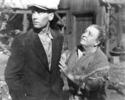A bridge crashes into the Mississippi at rush hour. Cheesy levees go down in New Orleans and few come to help or rebuild. States must rely on gambling for revenue to run essential public services yet fall farther into the pit of structural deficits. Clearly we have gone a long way from the legacy of the New Deal. read more »
Policy
Public Investment, Decentralization and Other Economic Lessons from the New Deal
The first lesson to be learned from this earlier era is that a large middle class requires an economy that generates a broad base of jobs paying middle-class wages. The New Dealers were not opposed to "rigging" the labor and financial markets to achieve this result. New Deal progressives believed the economy should exist to serve society, not the other way around, and that the government has a duty to shape the economy to meet middle-class aspirations. read more »
The New Deal & the Legacy of Public Works
Almost completely ignored in the press this year has been the 75th anniversary of the New Deal. Social Security, public housing, school lunches, deposit insurance, labor relations standards and banking regulations are among its many enduring legacies. On this anniversary, it is worth looking at the public works programs that constructed roads and buildings that still exist in every county in America. read more »
Progressives, New Dealers, and the Politics of Landscape
One of the greatest ironies of our time is the fact that today’s leading progressives tend to despise the very decentralized landscape that an earlier generation of New Deal liberals created. read more »
New York’s Next Fiscal Crisis
Mayor Bloomberg needs to prepare the city for the crash of the Wall Street gravy train. read more »
- Login to post comments
Questioning Conventional Wisdom: Should Poor Folks Stay Put?
There is reason to think again about the now-current idea of dispersing the population of poor folks in the Skid Row district of downtown Los Angeles and similar precincts in other cities across the U.S.
There’s cause to pause over notions such as mixing “affordable housing” that’s priced in the range of working-class or poor folks alongside spiffy market-rate units. read more »
The Entrenchment of Urban Poverty
How high urban housing costs and income inequality have exacerbated urban poverty
A few years ago, on a drive from New York to Washington, I turned off I-95 in Baltimore to see H.L. Mencken’s home. Abandoned row houses lined the street, some boarded up with plywood, others simply gutted. Signs offering fast cash for houses and a number to call for unwanted cars outnumbered pedestrians. It was a landscape of rot and neglect with few signs of renewal and investment. read more »
Suburbs Will Adapt to High Gas Prices
Will high gas prices doom the suburbs? The short answer is no. America’s investment in suburbia is too broad and deep and these will drive all kinds of technological and other adaptations. But the continued outward growth of new suburban housing tracts and power centers is unsustainable. read more »
Is Narcissus also a success story?
In sharp contrast with its arch-rival, Los Angeles, San Francisco historically has won plaudits from easterners. read more »
Heartland Development Strategy
From its inception as a nation, America's great advantage over its global rivals has stemmed largely from the successful development of its vast interior. The Heartland has been both the incubator of national identity and an outlet for the entrepreneurial energies of both immigrants and those living in dense urban areas. read more »
- Login to post comments






















